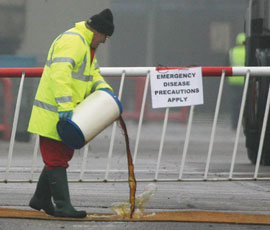Industry plans for exotic disease outbreaks

Ensuring welfare, managing the media and keeping market confidence were the three major concerns raised by industry representatives at a recent Animal Health and Veterinary Laboratories Agency (AHVLA) partnership day.
The day was an exercise to sound out the working relationship between the poultry industry and the AHVLA in the event of an exotic disease outbreak.
There was consensus that past outbreaks – such as avian influenza in 2006 – had been handled well by both sides.
Mark Williams, of the British Egg Industry Council, said that keeping market confidence in the poultry industry was “everything”, and it was important that movement licences – where appropriate – were granted quickly.
This was because parts of the poultry industry’s integrated supply chain bottlenecked: hatcheries could only keep birds for a day, broilers needed to go to slaughter as stocking density grew tighter, and eggs were legally tied into moving within 10 days of lay.
Disrupting this supply chain created welfare problems and could damage market confidence, said Mr Williams. He added that the general media would probably find out about any outbreak very quickly, and that messages needed to be managed carefully.
He recommended egg producers involved the BEIC in the first instance, which could assist in controlling communication and liaising with DEFRA and other local farmers. “The partnership has worked wonderfully well, and is a powerful way of dealing with things,” he said.
Daniel Parker of Slate Hall Veterinary Practice said that a loose word could “have a devastating impact”.
He also questioned using the term “outbreak” where disease incidence was very low, and added that movement controls needed to be managed. “It’s imperative that, if an outbreak occurs, we contain it.”
Mr Parker warned that the risk of welfare problems may be higher for free-range producers. “If the day comes up and the popholes don’t open, that can have a massive influence on behaviour,” he said.
Restrictions into movements needed to be lifted as soon as it was safe to do so, he added. “Draft licences [for movement] should be ready that need only minor modification.”
